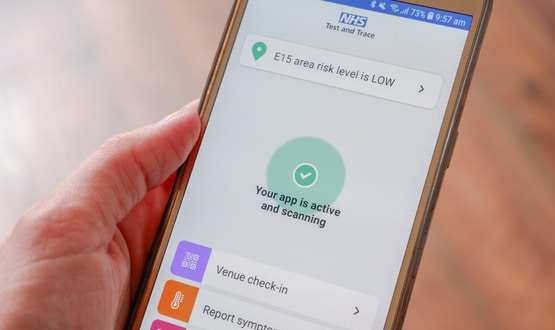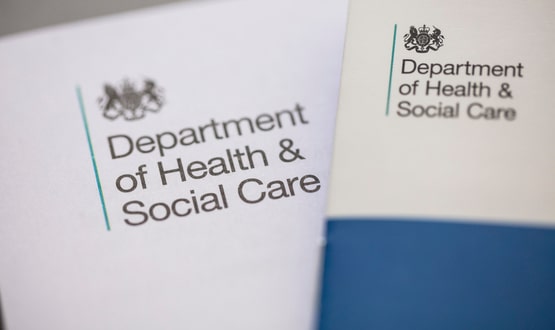‘Major questions unanswered’ about effectiveness of NHS Covid-19 App
- 5 October 2020

There are “major questions unanswered” about the effectiveness of the NHS Covid-19 App, a charity has said.
The app was officially launched in England and Wales on 24 September, after months of setbacks and multiple trials.
But the Health Foundation has raised concerns about the lack of published evidence from the app’s pilots, which it says could put public trust at risk.
“With a virus that is transmitted as quickly as Covid-19, the automated contact-tracing feature of the new NHS app could prove invaluable in reducing its spread,” Josh Keith, senior fellow at the Health Foundation said.
“But while evidence from recent pilots of this technology remains unpublished, major questions about its effectiveness are left unanswered, including how it will protect those communities who are most vulnerable to the virus yet may be among the least likely to use the app.”
A trial of the app was launched in August on the Isle of Wight, in the London borough of Newham and among NHS Volunteer Responders.
It followed a trial in May of a previous version of the app, though this was ultimately abandoned by the government in June.
The Department of Health and Social Care (DHSC) is yet to publish its findings from the app’s trial.
Keith said in failing to publish data from the trial, the government had “missed a vital opportunity” to gain public trust in the technology.
“The effectiveness of the app will be dependent on the public downloading it and changing their behaviour based on its advice,” he said.
“In failing to yet share the findings of the pilots, government has missed a vital opportunity to build people’s confidence in the new technology. It is now essential that how the public uses and responds to the app is continuously evaluated to ensure it is working effectively and any improvements are identified.”
Prior to the app’s launch parliament’s science and technology committee pressed Simon Thompson, the app’s managing director, for answers on findings from the trial including how many people downloaded the app.
Thompson said the trial had been “very encouraging” but refused to provide figures, instead saying evaluations would be published “as soon as practically possible”.
Following the launch, a spokesperson for DHSC told Digital Health News there was no update on when the pilot results would be published, adding that a full evaluation would be published in due course.
The app was downloaded more than 10 million times in the first three days after its launch, according to official figures. It is expected to cost more than £35 million by the end of this financial year.
Valuable lessons
Speaking to Digital Health News after the launch, Wolfgang Emmerich, founder of Zühlke Engineering which helped build the app, assured valuable lessons were learned during the trials.
“I don’t think it [the trial] was wasted at all. We learned from that trial that actually a good proportion of the population is interested in using an app,” he said.
Six updates were made during the trial, including adding multiple languages, the ability to manually enter test results and the ability to change the postcode to view local area risks if a user visits other areas. Emmerich said that more updates will be on the horizon.
“We fully expect that to continue. We have a very large roadmap of enhancements to the app that we will be working on over the next six months and I am expecting we will have learnings similar to what we had during the trial,” he added.





14 Comments
…even though My message (sent through the App ) disappeared quickly,l was able to get an Isolation Note with a reference number that l downloaded to My PDF to show My Manager !
Got a message that I had come into contact with someone but my phone and I was at home had no idea what to do, liking QR codes scanning almost everywhere if I see the information
It’s effectiveness is greatly reduced by low take-up. I am only one in my workplace using it. And not always possible to keep it on person – specially difficult for anyone without pockets so half the time phone is left on desk
And increasing numbers of employers hiding behind the mantra of Covid-security & banning use of app in case of ‘false’ notifications. Physical infrastructure such as screens do help but individual/group behaviour much more difficult to manage/enforce. Still have colleagues standing too close, passing each other on stairs and in corridors, opening doors to clients without masks. Each individual interaction may not be defined as close contact for tracing purposes as for v brief period but must carry a risk?
Sat outside McDonald’s yesterday. Customers were not using the app and a member of staff at the entrance was not challenging anyone. Realty disgusted.
I found the App worked well but isolation message disappeared too quickly – l phoned for advice on this issue as l thought l would need a ‘saved’message to show My Manager at work!
Sat outside McDonald’s yesterday. Customers were not using the app and a member of staff at the entrance was not challenging anyone. Realty disgusted.
Messages that appear and disappear are test messages. Please refer to the app.
I used the app to request a test here in hackney central. More than 5 days now and no results.
There seem to be no qr codes to scan
I live in Portsmouth have yet to find a qr to scan any where even at the qa hospital many thanks Barry
I got message saying been in conta t with someone then message disappearred
Go to Mountbatten centre if you want to try it out
As I am extremly vulnerable at present as i am recovering from oesophagus cancer and having chemotherapy i was recommended by hospital to download app which i did . So on Saturday evening I will say i havent been out for 4 days at least as chemotherapy has made me feel rough . The app told me to get tested very strange as that previous previous to my 4 days i had been to hospital and had a covid19 test which came back negative so i am disappointed with app so far feel like uninstalling it
I also got a message telling me to self isolate for 14 days. The message disappeared. I am doing it but I have no idea if it is right.
Comments are closed.